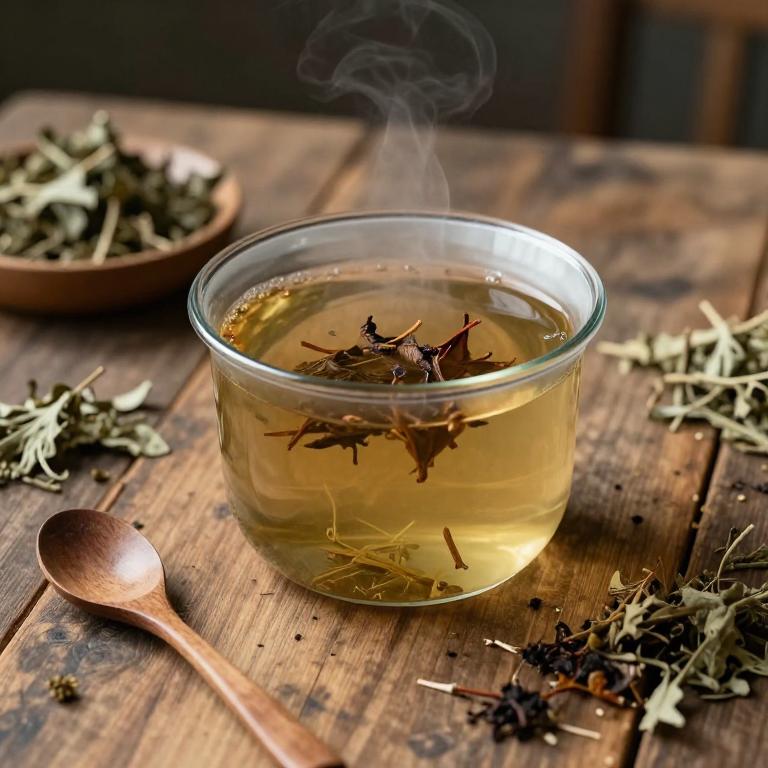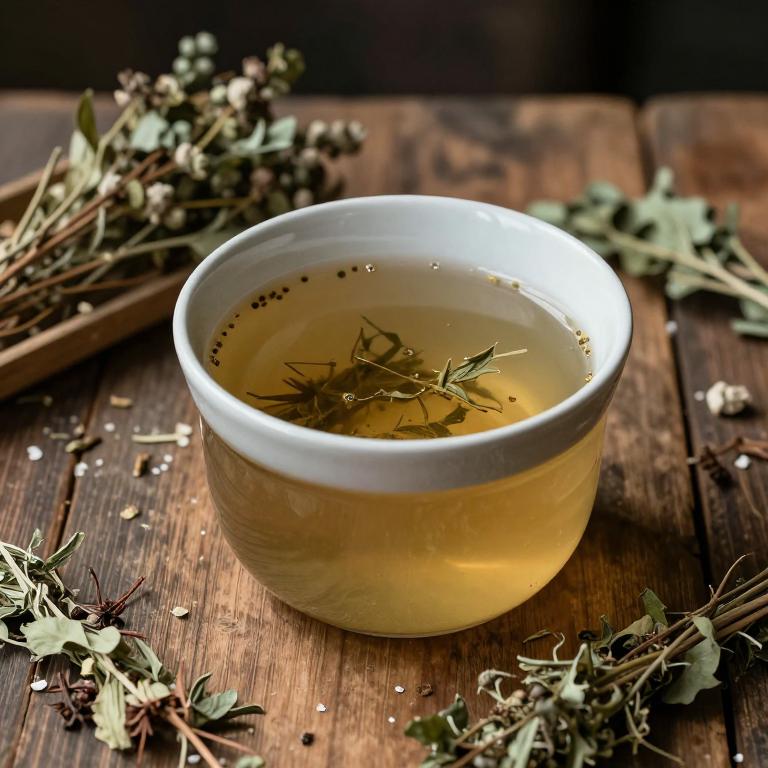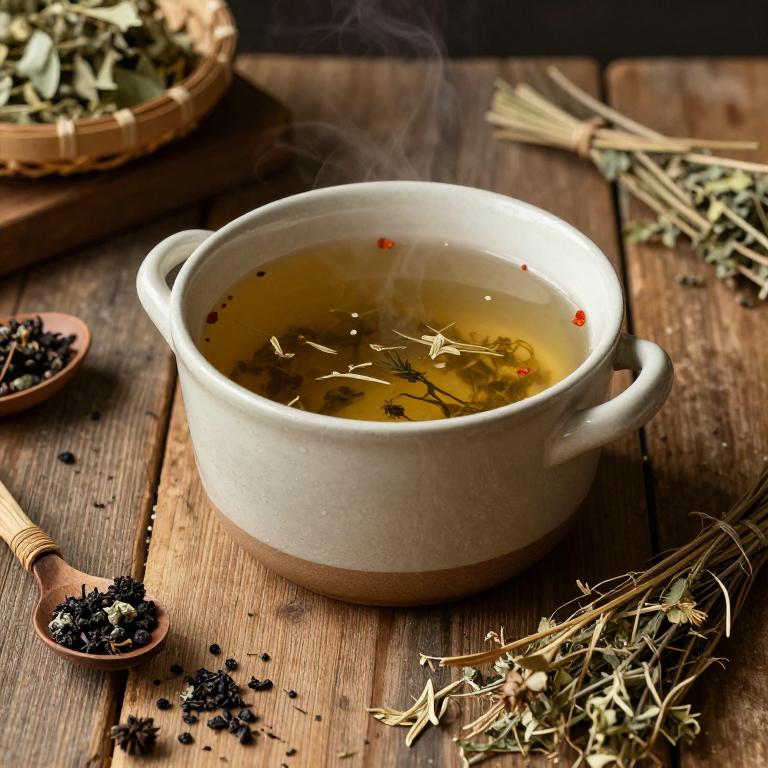10 Best Herbal Decoctions For Pimples

Herbal decoctions have been traditionally used to treat pimples due to their natural anti-inflammatory and antimicrobial properties.
Common herbs such as neem, turmeric, and chamomile are often incorporated into decoctions to soothe inflamed skin and reduce bacterial growth. To prepare a decoction, the herbs are simmered in water for an extended period, allowing their active compounds to dissolve into the liquid. This preparation method enhances the potency of the herbs, making the decoction effective for topical application.
Regular use of herbal decoctions can help manage acne symptoms and promote clearer skin, though it is advisable to consult a healthcare professional before starting any new treatment regimen.
Table of Contents
- 1. Aloe vera (Aloe barbadensis)
- 2. St. john's wort (Hypericum perforatum)
- 3. Ginger (Zingiber officinale)
- 4. Dog rose (Rosa canina)
- 5. Marigold (Calendula officinalis)
- 6. German chamomile (Chamomilla recutita)
- 7. Salvia (Salvia officinalis)
- 8. Camellia (Camellia sinensis)
- 9. English lavender (Lavandula angustifolia)
- 10. Black elderberry (Sambucus nigra)
1. Aloe vera (Aloe barbadensis)

Aloe barbadensis, commonly known as aloe vera, has been widely used in traditional medicine for its soothing and healing properties.
Herbal decoctions made from aloe vera gel or leaves are believed to help reduce inflammation and redness associated with pimples due to their anti-inflammatory and antimicrobial effects. These decoctions can be applied topically as a face mask or used in steam treatments to open pores and promote skin regeneration. The presence of vitamins, minerals, and antioxidants in aloe vera supports skin health and may help prevent future breakouts.
While generally safe, it is important to ensure proper preparation and dilution to avoid skin irritation or allergic reactions.
2. St. john's wort (Hypericum perforatum)

Hypericum perforatum, commonly known as St. John's Wort, is a herbal plant traditionally used for its purported anti-inflammatory and antimicrobial properties.
When prepared as a decoction, it involves simmering the dried plant material in water to extract its active compounds, such as hypericin and hyperforin. This herbal decoction has been explored for its potential to reduce acne by targeting bacterial growth and inflammation associated with pimples. However, it is important to note that while some studies suggest possible benefits, more research is needed to confirm its efficacy and safety for topical use.
As with any herbal remedy, it is advisable to consult a healthcare professional before incorporating it into a skincare routine.
3. Ginger (Zingiber officinale)

Zingiber officinale, commonly known as ginger, has been traditionally used in herbal medicine for its anti-inflammatory and antimicrobial properties.
When prepared as a decoction, ginger can be applied topically to the skin to help reduce redness and swelling associated with pimples. The active compounds in ginger, such as gingerol and shogaol, are believed to inhibit the growth of acne-causing bacteria and regulate sebum production. To make a ginger decoction, fresh ginger root is boiled in water for several minutes, then strained and cooled before application.
While some individuals may find it effective as a natural remedy, it is advisable to consult a dermatologist before using it as a treatment for persistent or severe acne.
4. Dog rose (Rosa canina)

Rosa canina, commonly known as dog rose, has been traditionally used in herbal medicine for its potential skin benefits, including the treatment of pimples.
The herbal decoction of Rosa canina is prepared by simmering the dried rose hips in water, allowing the beneficial compounds such as vitamin C, antioxidants, and anti-inflammatory agents to be extracted. These properties may help reduce inflammation and redness associated with acne, promoting clearer skin. Some studies suggest that the high concentration of bioflavonoids in Rosa canina may support skin health and potentially inhibit the growth of acne-causing bacteria.
However, while it may complement a skincare routine, it is advisable to consult a healthcare professional before using it as a treatment for persistent or severe acne.
5. Marigold (Calendula officinalis)

Calendula officinalis, commonly known as the pot marigold, is a flowering plant widely used in herbal medicine for its anti-inflammatory and antimicrobial properties.
Herbal decoctions made from calendula officinalis can be effective in treating pimples by reducing redness, swelling, and bacterial infection associated with acne. These decoctions are typically prepared by simmering the dried petals in water to extract their active compounds, such as flavonoids and triterpenoids. When applied topically, calendula decoctions may help soothe irritated skin and promote healing.
However, it is important to consult a healthcare professional before using calendula for acne, especially if you have allergies or are using other topical treatments.
6. German chamomile (Chamomilla recutita)

Chamomilla recutita, commonly known as German chamomile, has been traditionally used for its anti-inflammatory and antiseptic properties, making it a popular choice for treating skin conditions such as pimples.
Herbal decoctions made from chamomilla recutita can be applied topically to the skin to help reduce redness, swelling, and bacterial infection associated with acne. The active compounds in chamomile, such as flavonoids and essential oils, contribute to its ability to soothe irritated skin and promote healing. When preparing a decoction, the dried flowers are steeped in hot water for several minutes to extract their beneficial compounds.
While generally safe for topical use, it is important to perform a patch test to check for any allergic reactions, especially for those with sensitive skin.
7. Salvia (Salvia officinalis)

Salvia officinalis, commonly known as sage, has been traditionally used in herbal medicine for its potential benefits in treating skin conditions such as pimples.
Herbal decoctions made from dried sage leaves are often prepared by simmering the plant material in water to extract its active compounds, including flavonoids and essential oils. These decoctions are believed to possess antimicrobial and anti-inflammatory properties that may help reduce acne-causing bacteria and soothe inflamed skin. When applied topically, sage decoctions may help balance sebum production and promote clearer skin.
However, it is important to consult a healthcare professional before using sage for acne treatment, as it may interact with certain medications or cause allergic reactions in some individuals.
8. Camellia (Camellia sinensis)

Camellia sinensis, commonly known as the tea plant, is the source of various herbal decoctions that have been traditionally used for their potential skin benefits.
These decoctions, often prepared by boiling the leaves or stems, are believed to possess anti-inflammatory and antimicrobial properties that may help in treating acne. Some studies suggest that compounds found in Camellia sinensis, such as polyphenols and caffeine, can reduce sebum production and inhibit the growth of acne-causing bacteria. While preliminary research shows promise, more clinical trials are needed to fully understand their efficacy and safety for treating pimples.
As a complementary therapy, these decoctions may be used alongside conventional treatments under the guidance of a healthcare professional.
9. English lavender (Lavandula angustifolia)

Lavandula angustifolia, commonly known as English lavender, has been traditionally used for its soothing and anti-inflammatory properties, making it a popular choice in herbal decoctions for treating pimples.
The essential oils and active compounds found in lavender, such as linalool and lavender alcohol, possess antimicrobial and antiseptic qualities that can help reduce acne-causing bacteria on the skin. When prepared as a herbal decoction, lavender can be applied topically to calm inflamed skin and promote healing of blemishes. Its mild and calming nature makes it suitable for use in sensitive skin types, offering a natural alternative to conventional acne treatments.
Overall, lavender decoctions provide a gentle yet effective method for managing and preventing pimples through their soothing and antibacterial actions.
10. Black elderberry (Sambucus nigra)

Sambucus nigra, commonly known as the European elderberry, has been traditionally used in herbal medicine for its potential anti-inflammatory and antimicrobial properties.
Herbal decoctions made from the berries, flowers, or leaves of Sambucus nigra may help reduce inflammation and redness associated with pimples due to their high antioxidant content. Some studies suggest that compounds in elderberry may inhibit the growth of acne-causing bacteria, such as Propionibacterium acnes. However, it is important to note that while preliminary research is promising, more clinical trials are needed to fully establish its efficacy for treating acne.
As with any herbal remedy, it is advisable to consult a healthcare professional before using Sambucus nigra decoctions, especially if you have underlying health conditions or are taking other medications.